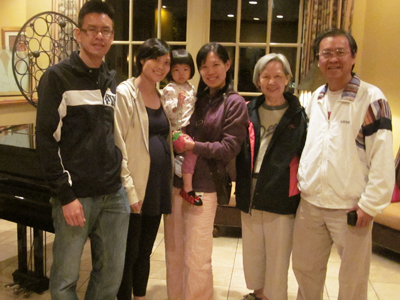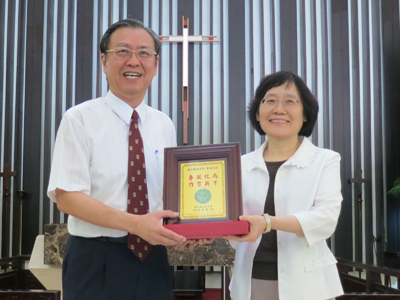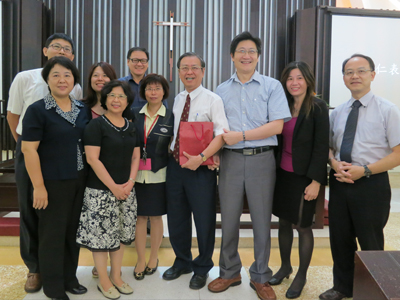| |
|
| |
2013年上海聖約翰大學全世界校友聯誼大會,將於十月在台北聖約翰大學校園舉行。我願藉此篇短文向來台參加校友大會的校友及陪同他們的家人表達最誠摯的敬賀之意。約大校友自稱約翰人(Johanneans),最年輕的年紀應已逾八十歲了,我非常榮幸曾應邀代表台北聖約翰大學(那時中文校名是新埔工業專科學校)參加1992年在上海約大老校園舉行的約大全世界校友聯誼大會,記得當時有近兩千校友參加。當時大會上討論最熱烈的議題是如何在上海重新籌建聖約翰大學,恢復及延續母校的光榮傳統。參與討論的校友都瞭解這是一極艱巨的任務,但校友均熱烈回應,並分工努力尋求可能的方案。爾後的幾屆世界校友大會亦針對復校的方案報告有關進度,但最後在上海復校的提議仍以不可能收場,約大校友復校的捐款除了在加拿大英屬哥倫比亞大學捐助成立聖約翰學院(St. John's College at the University of British Columbia)外,就以台灣上海聖約翰大學及聖瑪利女校,校友會與基督教台灣聖公會在1967年共同創辦的新埔工專最有成果。冀望將建校的目的即上海約大的傳統在台北延續發揚光大。多年來經董事會及師生的共同努力,改制為大學。台北約大期望繼承上海約大的優良校風,將教會辦學的火炬一代代傳承下去。
回顧上海約大與台北約大的校史,我們可以公允持平地指出兩校的創辦人都有相同的理念,即是在基督教會的根基上建立大學為社會教育未來的領導人才。
上海約大校友對二十世紀中國及世界卓越的貢獻大家已有目共睹。同樣我們也將在二十一世紀看到台北約大校友的傑出成就,今年十月上海約大校友來到台北約大校園,除了電腦,網路及智慧型手機外,他們能從年輕的學生身上看到什麼約翰人的特質?他們能看到他們六七十年前在上海約大學讀書時的身影嗎?換句話說,這些上海約大老校友提出的疑問,也正是目前台北約大師生面臨的最大挑戰,誰是新一代的約翰人?在那裏可以找到新約翰人?
我從事基督教高等教育工作近四十年,願針對以上疑問提出淺見與大家分享,首先,一所教會大學應將詩篇111篇第10節,"敬畏上帝是智慧的開端"作為每一間教室裡學生的座右銘。大學生在校的目的是追求知識及真理,瞭解真理的智慧應是他們追求的真知識。一旦學習到這屬天的智慧,他們將終身受益。然而要學到真智慧,學生必須先學會在造物主面前的謙卑。教會大學最重要的目標是要教學生知道謙卑是他們最應珍惜的基本價值。年歲越長、越要謙卑。如此他們才能真正看到、聽到及用心感覺到真理與智慧,這也與賈伯斯(Steve Jobs)在2005年向史丹佛大學畢業生說的"求知若飢,大智若愚"(Stay Hungry,Stay Foolish.)有同樣意涵。
其次,每位教師在設計課程時都應將品格教育包括在內。建立品格是大學教育非常重要的部分,學生畢業時不僅要具備專業知識及工作技能,更要在四年學習中培養良好品格與專業倫理。這些品格特質如誠信、公平、正義、謙卑、耐心及堅毅的勇氣等。就像使徒保羅在新約加拉太書5章22至23節所指出的聖靈的果子:仁愛、喜樂、和平、忍耐、恩慈、良善、信實、溫柔、節制,就可以做為教會大學品格教育的基本原則。
第三點是學生具有真智慧與好品格外,教會大學應幫助學生找尋生命中追求的目標及使命。一個他們可以全心投入且熱愛奉獻的使命,他們應能分辨及認知世人對他們的期許,且決定他們將來事業的目標。用他們在大學所學的知識服務人群,在畢業的那天他們能有信心,像聖經舊約的先知以賽亞回應上帝所說的:「我在這裏,請差遣我。」(以賽亞書6:8)讓我們用上述三個教育目標—智慧,品格,使命—作為標竿在台北約大的校園裏教育新一代的約翰人,我相信不需太長的時間即可找到我們理想中的約翰人。但從事教育工作的我們也要記住:「十年樹木,百年樹人」的中國古諺,教育工作是要一代一代傳承延續的,只要我們努力堅持教會大學的教育目標,我們有信心會不斷見證到新一代約翰人的傑出貢獻。
張中平(1989-2002 新埔工專、新埔技術學院校長,甫於2013年8月1日從聖約翰科大教職退休) |
|
| |
 |
 |
 |
| 張中平校長與家人及朋友合影 |
張中平校長接受陳金蓮校長頒贈「春風化雨、作育英才」紀念牌 |
張中平校長於退休茶會上與商管學院的同仁們合影留念 |
|
| |
|
| |
| A New Generation of Johanneans To Be Found |
|
As the 2013 World Reunion of Alumni of St. John's University (SJU), Shanghai, is going to be held on the campus of St. John's University, Taipei, in October, I would like to express my sincere and whole-hearted congratulations to all the Johanneans ( as alumni of SJU, Shanghai, prefer to be called, and most of them would be in their eighties) and their families, coming from different parts of the world, and from Mainland China. I remember I was honored to be invited to attend the 1992 SJU World Reunion on the old SJU campus in Shanghai, and there were about two thousand attendees from Alumni Chapters around the world. One of the important issues on the agenda was to seek for the possibilities of re-establishing their alma mater in Shanghai. People knew that it was almost a mission impossible, but discussions and actions were carried on for quite a long time at the following world reunions in Hong Kong, Canada, and the United States. The efforts proved to be in vain finally. It is a fact that St. John's University, Shanghai, ceased to exist after 1952. But St. John's University, Taipei, founded in 1967 by the Taiwan Alumni Associations of SJU, and St. Mary's Hall, Shanghai, together with Taiwan Sheng Kung Hui (the Episcopal Church of Taiwan), which claims to be successor to SJU-Shanghai, continues to uphold the SJU church college traditions in educating the young in Taiwan. While it is sad to see the shrinking number of SJU-Shanghai alumni in recent years, we have found more and more SJU-Taipei alumni attending the reunion events. The baton is passed on, or isn't it?
When we go back to review the history of both St. John's University, Shanghai, and St. John's University, Taipei, it is fair to say that the founders of both universities had the same ideals in mind: to educate and prepare the leaders for society in the future. We have seen SJU-Shanghai alumni's outstanding contributions to the new China and the world in the 20th century, and a hundred years later, we will see SJU-Taipei alumni play the same roles in different places of the world at crucial times in the 21st century. However, when the SJU-Shanghai alumni come to Taipei this October, what will they see from the young students on the SJU-Taipei campus other than computers, internet, and smart phones? Will they be able to find their young images sixty or seventy years ago on the SJU-Shanghai campus? In other words, the questions facing them as well as challenging every one of us, faculty, staff, and students of SJU-Taipei are: Who are the new Johanneans? And where can we find the new Johanneans?
As an educator in Christian higher education for nearly forty years, I would like to share the following insights and observations with those who are interested in finding an answer to the above questions at a church university.
First of all, the university should have Psalm 111:10, "The fear of the LORD is the beginning of wisdom," hung high in every classroom as their motto.
Students at a university are to learn knowledge. They want to find out what truth is. Wisdom is the true knowledge they seek for. Once gained, they can count on it for the rest of their lives. In order to learn true knowledge, however, students have to be taught to remain humble in front of the Creator. A church university has to set it as the first priority for students to learn humility as their basic value to cherish and to grow with it. Then they may see wisdom with their eyes, hear wisdom with their ears, and understand wisdom with their hearts. I would think this was what Steve Jobs meant when he told Stanford University graduates at their graduation ceremony in 2005 when he quoted that famous saying, "Stay Hungry, stay foolish."
Second, every faculty member should have character ethics in mind as they design their curriculum in their particular fields. Character building is a very important aspect of a college education. Students should not only be equipped with job skills as they graduate with a degree, they should also be ready with professional ethics based on the virtues of good character formed in four years of a college education , namely, integrity, justice, righteousness, humility, patience and courage, etc. The list can go on and on. But I believe what Paul points out in Galatians 5: 22-23, the fruit of the Spirit: love, joy, peace, patience, kindness, goodness, faithfulness, gentleness, and self-control, should always be the guidelines of character building in a church college education.
Finally, after students are ready with wisdom and character ethic, a church college education should prepare them for a mission in life, a mission they can pursue with love, enthusiasm, devotion, and dedication. They should be able to discern and figure out what is expected of them in their future. They should be able to determine what their future career goals are. They should also be able to meet the needs of others with what they have learned at school. On the day of graduation, they should be ready to say, "Here am I. Send me!" as the prophet, Isaiah, says in Isaiah: 6:8.
With the three educational goals—wisdom, character, mission in mind, together, let's go find out this new generation of Johanneans on the campus of St. John's University, Taipei. Hopefully, it won't take us too long to identify them. But do remember a famous Chinese saying as we endeavor in education: "It takes ten year to grow a tree, and it takes a hundred years to educate a person." 十年樹木 百年樹人. If we keep on the good work of the church college traditions, I believe that the goals will be achieved in the new generations of students to come.
Andrew Chung-Ping Chang 張中平
President of St. John's University, Taipei, 1989-2002, retired from teaching at SJU-Taipei on August 1, 2013.
|
|
|